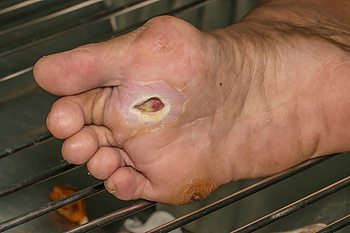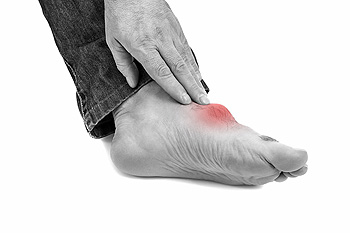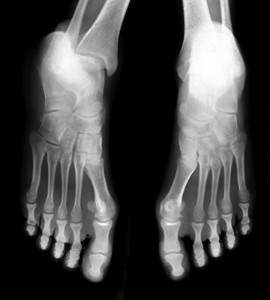
 A wound is considered to be a laceration. Patients who are dietetic may be familiar with the possibility of getting wounds on the feet. If these are not promptly treated, an infection may develop, and can potentially be a serious condition. Wounds on the feet may be less serious for people who are not diabetic, and minor wounds may be treated with surgical tape. Research has indicated the importance of keeping the wound and surrounding area dry and clean, as this may help to prevent an infection. If you have any type of wounds on the feet, it is strongly suggested that you consult with a podiatrist who can properly treat this condition.
A wound is considered to be a laceration. Patients who are dietetic may be familiar with the possibility of getting wounds on the feet. If these are not promptly treated, an infection may develop, and can potentially be a serious condition. Wounds on the feet may be less serious for people who are not diabetic, and minor wounds may be treated with surgical tape. Research has indicated the importance of keeping the wound and surrounding area dry and clean, as this may help to prevent an infection. If you have any type of wounds on the feet, it is strongly suggested that you consult with a podiatrist who can properly treat this condition.
Wound care is an important part in dealing with diabetes. If you have diabetes and a foot wound or would like more information about wound care for diabetics, consult with Dr. Alan J. Spector from Shore Podiatry. Our doctor will assess your condition and provide you with quality foot and ankle treatment.
What Is Wound Care?
Wound care is the practice of taking proper care of a wound. This can range from the smallest to the largest of wounds. While everyone can benefit from proper wound care, it is much more important for diabetics. Diabetics often suffer from poor blood circulation which causes wounds to heal much slower than they would in a non-diabetic.
What Is the Importance of Wound Care?
While it may not seem apparent with small ulcers on the foot, for diabetics, any size ulcer can become infected. Diabetics often also suffer from neuropathy, or nerve loss. This means they might not even feel when they have an ulcer on their foot. If the wound becomes severely infected, amputation may be necessary. Therefore, it is of the upmost importance to properly care for any and all foot wounds.
How to Care for Wounds
The best way to care for foot wounds is to prevent them. For diabetics, this means daily inspections of the feet for any signs of abnormalities or ulcers. It is also recommended to see a podiatrist several times a year for a foot inspection. If you do have an ulcer, run the wound under water to clear dirt from the wound; then apply antibiotic ointment to the wound and cover with a bandage. Bandages should be changed daily and keeping pressure off the wound is smart. It is advised to see a podiatrist, who can keep an eye on it.
If you have any questions, please feel free to contact our office located in Point Pleasant, NJ . We offer the newest diagnostic and treatment technologies for all your foot care needs.
 Research has indicated that the majority of babies are born with flat feet. This is a result of flexible bones, ligaments, and tendons which prevent the arch from forming. When children are approximately age six, the feet will become stronger, and the arch will develop. Research has shown there are a small percentage of children who will continue to have flat feet throughout their lives. This condition may be acceptable to live with, as long as the feet are not stiff, and there is no pain. There may be physical reasons why flat feet occur. These can include having a tight Achilles tendon, or having rigid feet. This may cause difficulty in moving the foot in any direction, and could lead to arthritis. If your child has not outgrown flat feet, it is strongly suggested that you seek the counsel of a podiatrist who can help you to determine the reason.
Research has indicated that the majority of babies are born with flat feet. This is a result of flexible bones, ligaments, and tendons which prevent the arch from forming. When children are approximately age six, the feet will become stronger, and the arch will develop. Research has shown there are a small percentage of children who will continue to have flat feet throughout their lives. This condition may be acceptable to live with, as long as the feet are not stiff, and there is no pain. There may be physical reasons why flat feet occur. These can include having a tight Achilles tendon, or having rigid feet. This may cause difficulty in moving the foot in any direction, and could lead to arthritis. If your child has not outgrown flat feet, it is strongly suggested that you seek the counsel of a podiatrist who can help you to determine the reason.
Making sure that your children maintain good foot health is very important as they grow. If you have any questions, contact Dr. Alan J. Spector of Shore Podiatry. Our doctor can provide the care you need to keep you pain-free and on your feet.
Keeping Children's Feet Healthy
Having healthy feet during childhood can help prevent medical problems later in life, namely in the back and legs. As children grow, their feet require different types of care. Here are some things to consider...
Although babies do not walk yet, it is still very important to take care of their feet.
Avoid putting tight shoes or socks on his or her feet.
Allow the baby to stretch and kick his or her feet to feel comfortable.
As a toddler, kids are now on the move and begin to develop differently. At this age, toddlers are getting a feel for walking, so don’t be alarmed if your toddler is unsteady or ‘walks funny’.
As your child gets older, it is important to teach them how to take care of their feet.
Show them proper hygiene to prevent infections such as fungus.
Be watchful for any pain or injury.
Have all injuries checked by a doctor as soon as possible.
Comfortable, protective shoes should always be worn, especially at play.
If you have any questions please feel free to contact our office located in Point Pleasant, NJ . We offer the newest diagnostic and treatment technologies for all your foot and ankle needs.
 There are several types of arthritis, including gout. It is known to be a painful condition that generally affects the big toe. Some of the symptoms that are associated with gout can include severe pain and discomfort, redness, and the affected area may feel hot. It may occur as a result of elevated uric acid levels in the blood, and can form crystals which lodge in the joints of the big toe. Existing factors that may increase the chances of being afflicted with gout can consist of being diabetic, having high blood pressure, or being overweight. There are methods that can be taken which may prevent gout attacks. It is helpful to reduce alcohol intake, eliminate food and drinks that have high sugar levels, and avoid red meat. If you have experienced a gout attack, it is strongly recommended that you are under the care of a podiatrist.
There are several types of arthritis, including gout. It is known to be a painful condition that generally affects the big toe. Some of the symptoms that are associated with gout can include severe pain and discomfort, redness, and the affected area may feel hot. It may occur as a result of elevated uric acid levels in the blood, and can form crystals which lodge in the joints of the big toe. Existing factors that may increase the chances of being afflicted with gout can consist of being diabetic, having high blood pressure, or being overweight. There are methods that can be taken which may prevent gout attacks. It is helpful to reduce alcohol intake, eliminate food and drinks that have high sugar levels, and avoid red meat. If you have experienced a gout attack, it is strongly recommended that you are under the care of a podiatrist.
Gout is a foot condition that requires certain treatment and care. If you are seeking treatment, contact Dr. Alan J. Spector from Shore Podiatry. Our doctor will treat your foot and ankle needs.
What Is Gout?
Gout is a type of arthritis caused by a buildup of uric acid in the bloodstream. It often develops in the foot, especially the big toe area, although it can manifest in other parts of the body as well. Gout can make walking and standing very painful and is especially common in diabetics and the obese.
People typically get gout because of a poor diet. Genetic predisposition is also a factor. The children of parents who have had gout frequently have a chance of developing it themselves.
Gout can easily be identified by redness and inflammation of the big toe and the surrounding areas of the foot. Other symptoms include extreme fatigue, joint pain, and running high fevers. Sometimes corticosteroid drugs can be prescribed to treat gout, but the best way to combat this disease is to get more exercise and eat a better diet.
If you have any questions please feel free to contact our office located in Point Pleasant, NJ . We offer the newest diagnostic and treatment technologies for all your foot and ankle needs.
Read more about Gout People who enjoy running are generally familiar with the importance of properly training, which often includes gradually increasing mileage and speed. This may be beneficial in reducing the risk of getting a stress fracture. This type of injury is known as a hairline fracture, and develops over time. It occurs when the bones are stressed from frequent exercise, and are unable to heal properly. An X-ray is typically taken to determine the extent of the stress fracture, followed by implementing recovery methods. These can consist of wearing a protective boot for approximately six weeks, or having surgery performed that may be necessary to heal severe stress fractures. If you have endured this type of injury, it is advised that you schedule a consultation with a podiatrist who can guide you toward treatment options that are correct for you.
People who enjoy running are generally familiar with the importance of properly training, which often includes gradually increasing mileage and speed. This may be beneficial in reducing the risk of getting a stress fracture. This type of injury is known as a hairline fracture, and develops over time. It occurs when the bones are stressed from frequent exercise, and are unable to heal properly. An X-ray is typically taken to determine the extent of the stress fracture, followed by implementing recovery methods. These can consist of wearing a protective boot for approximately six weeks, or having surgery performed that may be necessary to heal severe stress fractures. If you have endured this type of injury, it is advised that you schedule a consultation with a podiatrist who can guide you toward treatment options that are correct for you.
Activities where too much pressure is put on the feet can cause stress fractures. To learn more, contact Dr. Alan J. Spector from Shore Podiatry. Our doctor can provide the care you need to keep your pain free and on your feet.
Dealing with Stress Fractures of the Foot and Ankle
Stress fractures occur in the foot and ankle when muscles in these areas weaken from too much or too little use. The feet and ankles then lose support when walking or running from the impact of the ground. Since there is no protection, the bones receive the full impact of each step. Stress on the feet can cause cracks to form in the bones, thus creating stress fractures.
What Are Stress Fractures?
Stress fractures occur frequently in individuals whose daily activities cause great impact on the feet and ankles. Stress factors are most common among:
Symptoms
Pain from the fractures occur in the area of the fractures and can be constant or intermittent. It will often cause sharp or dull pain with swelling and tenderness. Engaging in any kind of activity which involves high impact will aggravate pain.
If you have any questions please feel free to contact our office located in Point Pleasant, NJ . We offer the newest diagnostic and treatment technologies for all your foot and ankle needs.